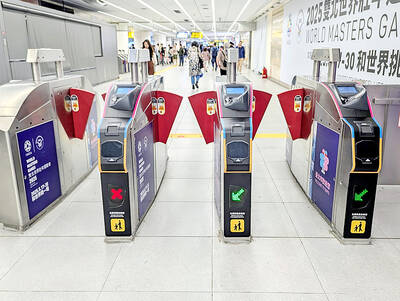Hospital visits related to epileptic seizures are highest in January and February, when the weather is coldest and the effects of air pollution are greatest, a Taichung pediatrician said on Monday.
Kuang Tien General Hospital pediatrician Chiang Kuo-liang (江國樑), who has been studying the relationship between epilepsy and environment for five years, published his findings in the journal Epilepsy & Behavior on Dec. 12.
Conducted from 2009 to 2013, Chiang’s research showed that decreases in temperature and sunlight hours, along with increases in air pressure, rainfall and air pollutants — such as methane, nitric oxide, nitrogen dioxide, carbon monoxide and non-methane hydrocarbons — are correlated with an increase in epilepsy-related hospital visits.
Citing data from hospitals across Taiwan, Chiang said that in January and February, about 60 people with epilepsy are affected by environmental changes each day on average, representing a 13.7 percent increase over other months.
Of all the aspects of environmental changes observed in the study, falling temperatures had the greatest effect, he said, adding that with every 10°C drop, there was a 6 percent increase in hospital visits for epilepsy.
In February, which is often the coldest month of the year, hospitals on average treat about 630 more epilepsy patients compared with the monthly average, while in August, they treat nearly 70 fewer patients than the monthly average, he said.
High air pressure in winter was also a major factor, he said, adding that high-pressure weather systems also bring cold air and humidity.
Those susceptible to seizures should also monitor air quality, which decreases substantially in the winter, he said.
Although the WHO recommends that air pollution consisting of fine particulate matter smaller than 2.5 micrometers should not exceed 10 micrograms per cubic meter (mg/m3), Taiwan has set a standard of 15mg/m3, and even that level is sometimes exceeded in winter months, Chiang said.
When levels exceed 15mg/m3, people should remain indoors whenever possible and wear masks when outside, he said.
For people with epilepsy, environmental changes during the winter can cause excessive activity in the cranial nervous system, which can lead to a seizure, he said.
People with epilepsy might also have poorer sleep quality when air quality is bad, or might have trouble breathing properly during sleep, which could lead to a lack of oxygen in the brain, thereby leading to a seizure, he added.
During winter months, those prone to seizures should stay warm, stay indoors on cold days or when air quality is bad, and avoid spicy foods, he said.

A magnitude 6.4 earthquake struck off the coast of Hualien County in eastern Taiwan at 7pm yesterday, the Central Weather Administration (CWA) said. The epicenter of the temblor was at sea, about 69.9km south of Hualien County Hall, at a depth of 30.9km, it said. There were no immediate reports of damage resulting from the quake. The earthquake’s intensity, which gauges the actual effect of a temblor, was highest in Taitung County’s Changbin Township (長濱), where it measured 5 on Taiwan’s seven-tier intensity scale. The quake also measured an intensity of 4 in Hualien, Nantou, Chiayi, Yunlin, Changhua and Miaoli counties, as well as

Credit departments of farmers’ and fishers’ associations blocked a total of more than NT$180 million (US$6.01 million) from being lost to scams last year, National Police Agency (NPA) data showed. The Agricultural Finance Agency (AFA) said last week that staff of farmers’ and fishers’ associations’ credit departments are required to implement fraud prevention measures when they serve clients at the counter. They would ask clients about personal financial management activities whenever they suspect there might be a fraud situation, and would immediately report the incident to local authorities, which would send police officers to the site to help, it said. NPA data showed

ENERGY RESILIENCE: Although Alaska is open for investments, Taiwan is sourcing its gas from the Middle East, and the sea routes carry risks, Ho Cheng-hui said US government officials’ high-profile reception of a Taiwanese representative at the Alaska Sustainable Energy Conference indicated the emergence of an Indo-Pacific energy resilience alliance, an academic said. Presidential Office Secretary-General Pan Men-an (潘孟安) attended the conference in Alaska on Thursday last week at the invitation of the US government. Pan visited oil and gas facilities with senior US officials, including US Secretary of the Interior Doug Burgum, US Secretary of Energy Chris Wright, Alaska Governor Mike Dunleavy and US Senator Daniel Sullivan. Pan attending the conference on behalf of President William Lai (賴清德) shows a significant elevation in diplomatic representation,

The Taipei MRT is to begin accepting mobile payment services in the fall, Taipei Rapid Transit Corp said on Saturday. When the company finishes the installation of new payment units at ticketing gates in October, MRT passengers can use credit cards, Apple Pay, Google Pay and Samsung Pay, the operator said. In addition, the MRT would also provide QR payment codes — which would be compatible with Line Pay, Jkopay, iPass Money, PXPay Plus, EasyWallet, iCash Pay, Taiwan Pay and Taishin Pay — to access the railway system. Currently, passengers can access the Taipei MRT by buying a single-journey token or using EasyCard,